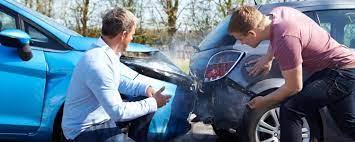
INDIANA – Being involved in a road traffic accident can be a stressful and traumatic situation, even if you are just a witness. With emotions heightened and shock playing a major role in the aftermath of an incident, it can be easy to make mistakes after a stressful collision.
This is why experts at High Rise Legal Funding, a pre-settlement legal funding company, have revealed the biggest mistakes many victims in road traffic accidents have made and how to avoid them should you become a victim yourself.

- Reacting too quickly and causing more damage
In the heat of the moment, whether you are at fault or not, it can be easy to assume you have been wrongly done and act on emotion and adrenaline. In situations like road traffic collisions, it is normal for the shock to take over and for you to immediately start to panic, which can make the situation more stressful than it already is. This is why you must take a second to regulate your breathing which will aid a calm manner for you to carry on dealing with the situation.
If you immediately start apologising to the other party before taking a moment to take in what just happened, you have already opened yourself up to being at fault when this might not be true. The other driver could have caused the accident and now has confirmation that you aren’t aware of what they have done, placing them as innocent.
- Declining or avoiding medical assistance
You don’t have to be involved in an extreme car collision to receive medical assistance; in fact, it is advised that any crash which has caused trauma to the body, especially the head or spine, that you are assessed at the scene of the incident as paramedics and healthcare professionals will be able to determine if you have any injuries, even if they are potentially life-threatening or not.
If you decline immediate medical assistance, you could have an internal injury that needs treating fast, such as internal bleeding, which can have severe consequences. Other less life-threatening but important injuries that might go a miss or be brushed off as minor are whiplash and hard knocks to the skull which can later go on to cause problems.
- Failing to gather evidence and information
The number one priority is safety and getting you and any passengers medical assistance if needed. The second priority should be ensuring you have the evidence to back up the situation.
Take photos of both vehicles and any injuries that have occurred; this will later need to be passed on to your insurance company if you make a claim. Getting a hold of evidence while you are still at the scene can give your attorney the best start in launching any investigation, as well as help law enforcement to understand the situation clearer.
Write down the contact information of everyone at the scene, including any bystanders that may have witnessed the incident and be able to give comments on the accident.
- Not calling law enforcement
In some states, it is a legal requirement to contact the police after a road traffic accident. A police officer at the scene can collect valuable evidence, which could help aid your case and get the process done in a smooth and efficient fashion.
They can also track down witnesses, assess the road and take official photographs that can’t be duplicated. This leaves one less job for you if a medical professional is currently assessing you or any passengers.
By not calling the police, you allow the other potentially at-fault driver to get away with the accident without proper caution, meaning they could potentially go off and do it again, causing a risk to the rest of society. If the case goes to court, a jury might also question why law enforcement wasn’t called, which can look suspicious.
- Not filing the case soon enough
In some states, there is a legal time limit in which you must file a claim after an accident. Beware of insurance companies that might be aware of this and try to elongate the process, causing your time to run out and your chance to proceed to be gone.
- Don’t take the insurance company’s word for it
Insurance companies deny quality claims as the longer they refuse to pay you, the more money they get. It is advised to speak to an injury lawyer and ask them to evaluate your claim, as they will know if you are getting a fair deal or not. They can also advise you to stick to your fight for a bigger payment, should they feel you are entitled.
Also, insurance companies may say you are getting the best settlement possible when this is not the case; the first offer is usually not great, which is why you should pursue your case to its maximum and take your time to convince them you deserve more than what they are offering.
END



